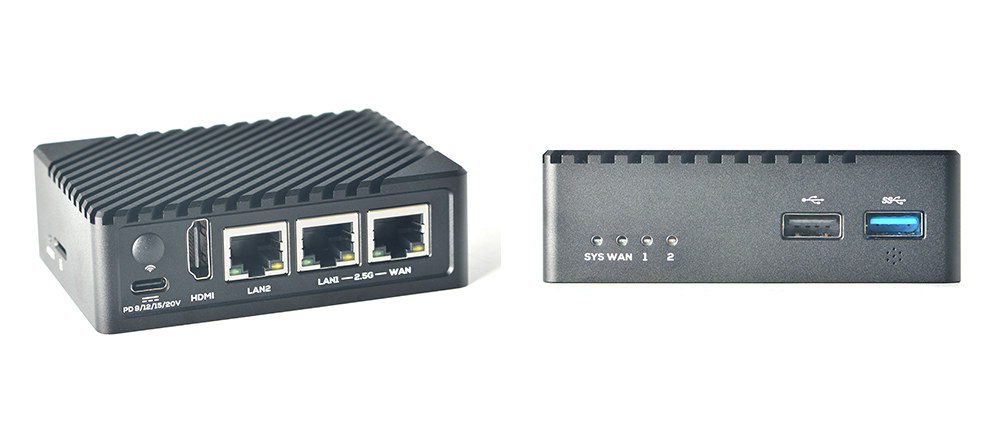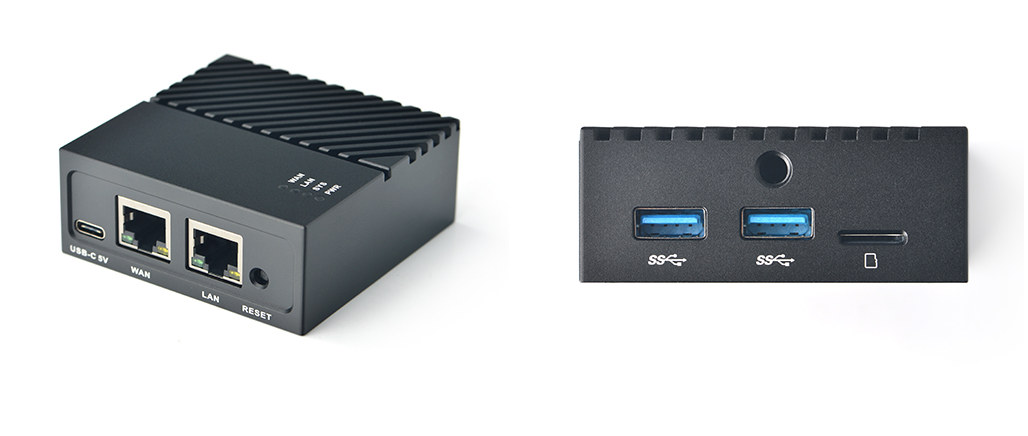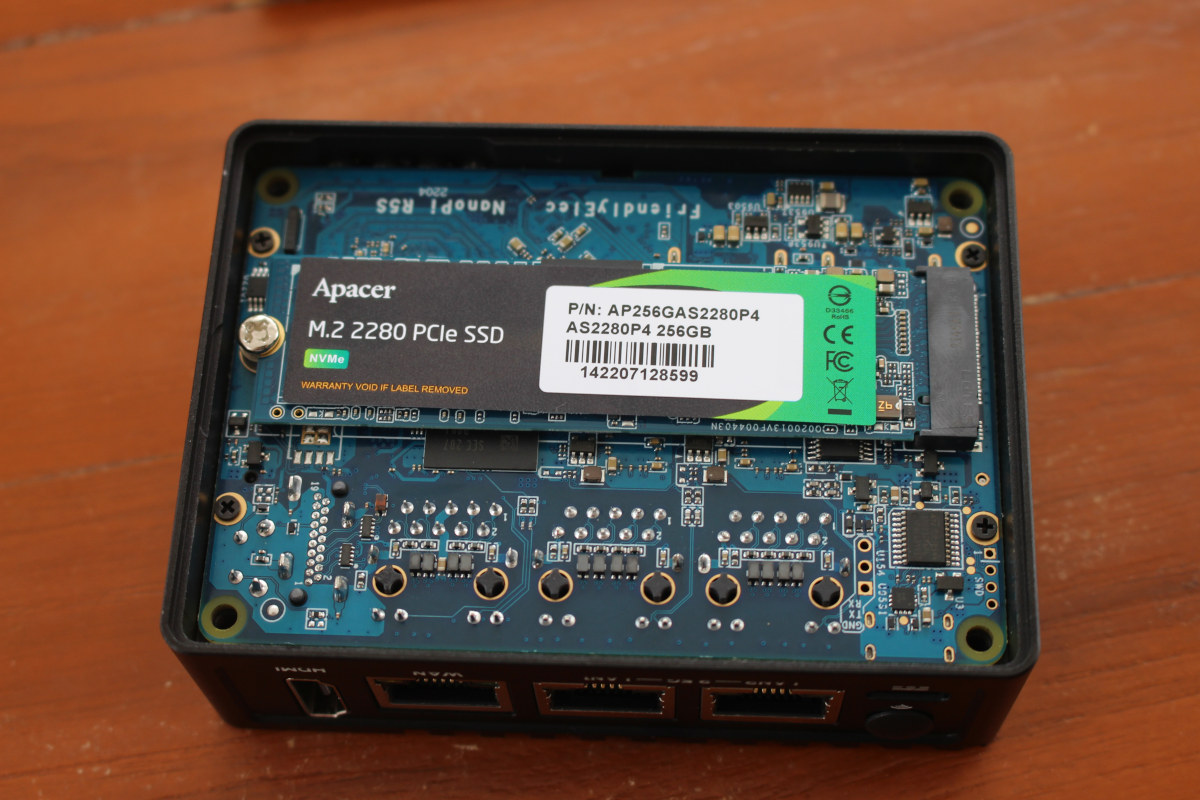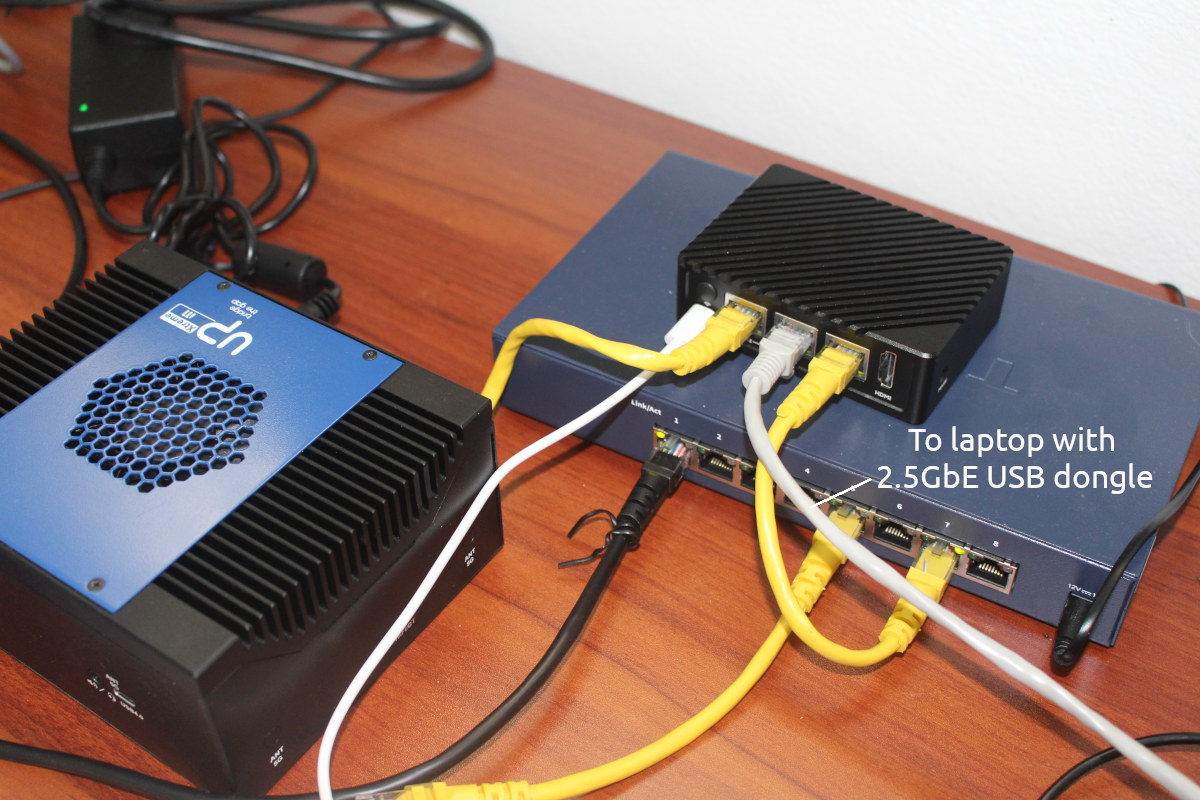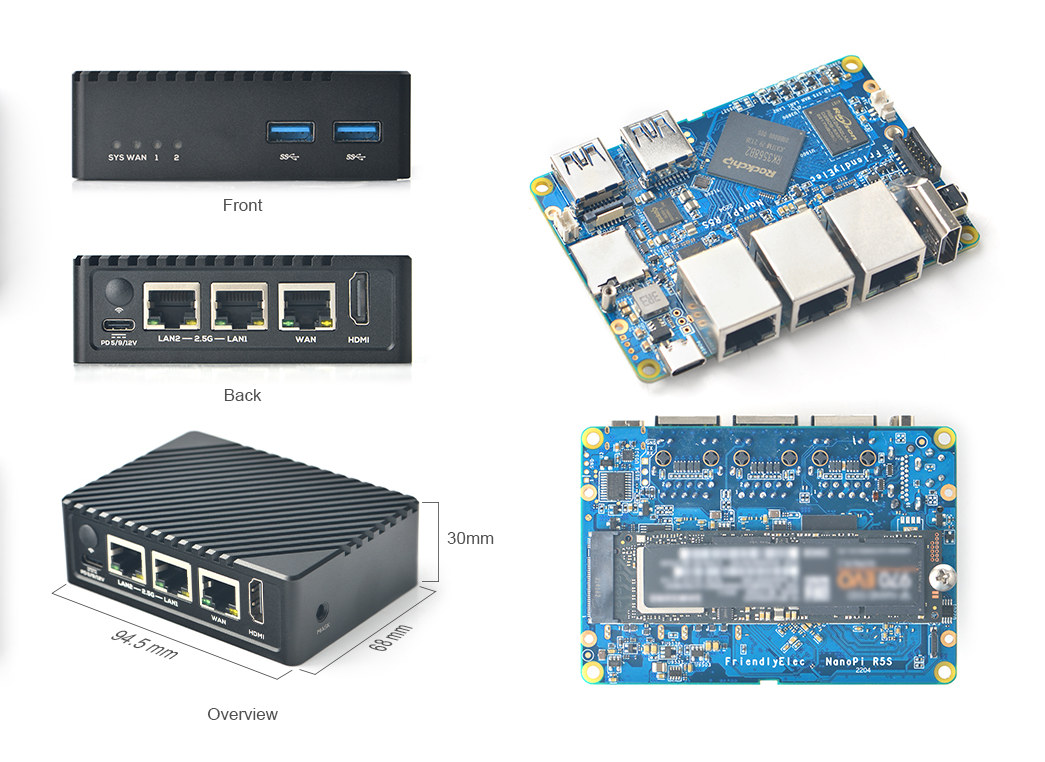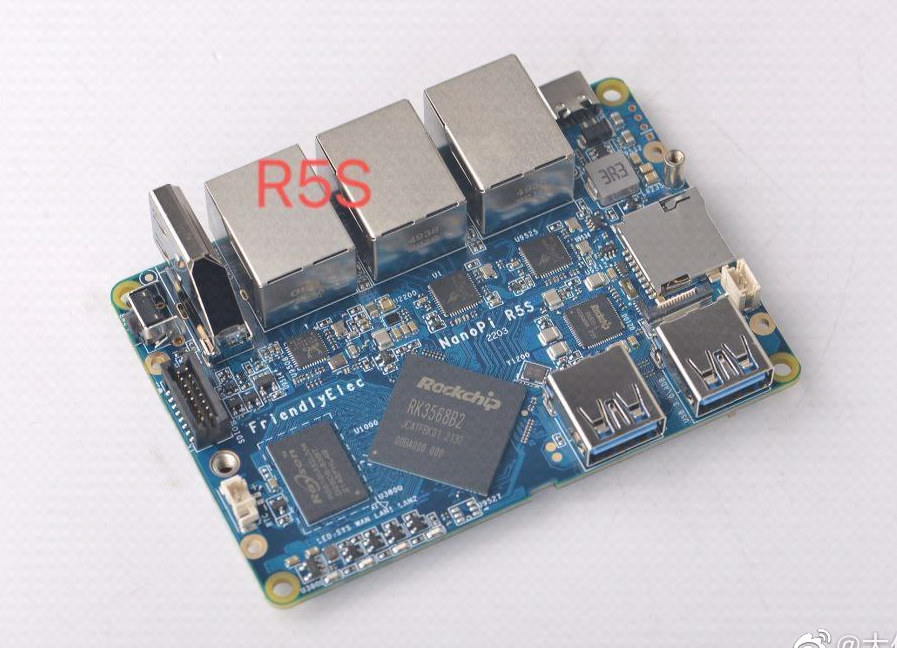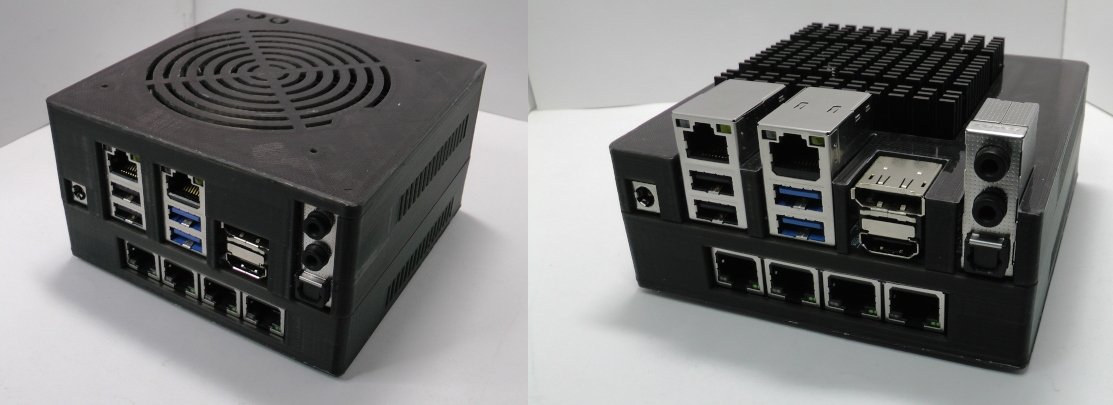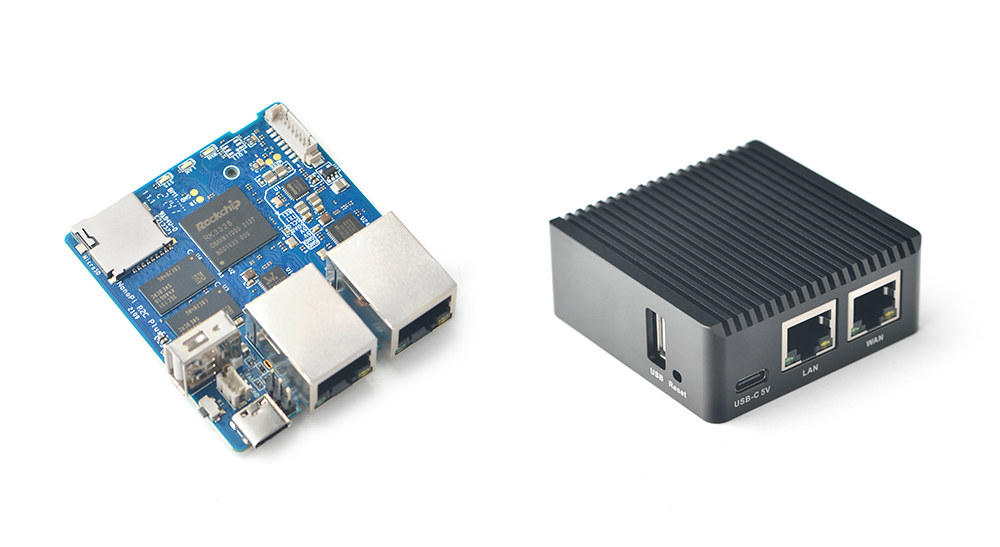FriendlyELEC has launched its sixth generation router with the NanoPi R6S equipped with a Rockchip RK3588S processor, two 2.5GbE ports, one Gigabit Ethernet port, and two USB interfaces. But the device will not exactly be limited to router functions as it comes with 8GB RAM, a 32GB eMMC flash, and an HDMI 2.1 port that support up to 8Kp60 video output, not to mention 8K video decoding capability and the integrated 6 TOPS NPU for AI workloads. NanoPi R6S specifications: SoC – Rockchip RK3588S octa-core processor with: CPU – 4x Cortex-A76 cores @ up to 2.4 GHz, four Cortex-A55 cores @ 1.8 GHz GPU – Arm Mali-G610 MP4 quad-core GPU with OpenGL ES3.2 / OpenCL 2.2 / Vulkan1.1 support VPU – 8Kp60 H.265/VP9/AVS2 video decoder, 8Kp30 H.264 decoder, 4Kp60 AV1 decoder, 8Kp30 H.265/H.264 video encoder AI accelerator – 6 TOPS NPU System Memory – 8GB LPDDR4X @ 2133 MHz Storage […]
NanoPi R4SE dual Gigabit Ethernet router adds 32GB eMMC flash
NanoPi R4SE is a variant of the Rockchip RK3399-powered NanoPi R4S dual Gigabit Ethernet router that adds a 32GB eMMC flash instead of only relying on a microSD card for the operating system. Most of the specifications remain the same with dual GbE, two USB 3.0 ports, but the router is now only offered with 4GB LPDDR4 and there’s no option for only 1GB RAM, and the GPIO and USB 2.0 headers are gone. The listed temperature range also changed from -20°C to 70°C to 0°C to 80°C. NanoPi R4SE specifications: SoC – Rockchip RK3399 hexa-core processor with dual-Core Cortex-A72 up to 2.0 GHz, quad-core Cortex-A53 up to 1.5 GHz, Mali-T864 GPU with OpenGL ES1.1/2.0/3.0/3.1, OpenCL, DX11, and AFBC support, 4K VP9 and 4K 10-bit H265/H264 60fps video decoder System Memory – 4GB LPDDR4 Storage – 32GB eMMC flash, MicroSD card slot Networking – 2x GbE, including one native Gigabit […]
NanoPi R5S preview – Part 2: Ubuntu 20.04 (FriendlyCore)
I started the NanoPi R5S review with an unboxing, a teardown, a quick try of the pre-installed OpenWrt-based FriendlyWrt, and some iperf3 benchmarks on the 2.5GbE interfaces that were rather disappointing. I test further I switched to the Ubuntu 20.04-based FriendlyCore image since I’m more familiar with Debian-based operating systems, and some tools will not run on OpenWrt. Note the performance is still not quite optimal, and that’s why I call this a preview since numbers should improve in the next few months as more people tweak the software. OpenWrt optimizations? But before jumping to Ubuntu, I gave an updated version of FriendlyWrt a try as FriendElec told me they had added some optimizations: We have made some optimizations on the new image, such as NIC interrupt settings, and offload support… So I downloaded “rk3568-eflasher-friendlywrt-20220526.img.gz” found on Google Drive, flashed it to a microSD card with USBImager, and booted it […]
NanoPi R5S router review – Part 1: Unboxing, OpenWrt, and iperf3 benchmarking
FriendlyElec has just launched the NanoPi R5S mini router powered by a Rockchip RK3568 processor, and the company kindly sent me two samples for review. In the first part of the review, I’ll check out the device itself, the internal design, the preinstalled OpenWrt, and run some networking benchmarks with iperf3. NanoPi R5S unboxing The router comes fully assembled together with a 3M sheet with 6 rubber feet, which, as we’ll see below, are not really necessary. A microSD card socket can be found on one of the sides, while the rear panel comes with a USB-C port for power, a WiFi antenna hole (which can also be used to run cables for GPIO. UART console, etc…), two 2.5GbE RJ45 LAN ports, a Gigabit Ethernet WAN port, and HDMI video output. We’ll find a Mask button for firmware flashing on the other side, and the front panel features four […]
NanoPi R5S Rockchip RK3568 mini router launched for $59 and up
The Rockchip RK3568-powered NanoPi R5S SBC with two 2.5GbE ports, one Gigabit Ethernet port, and M.2 NVMe storage is now available for $59, or $75 with a metal enclosure. As previously mentioned, the mini router board is equipped with 2GB RAM, 8GB eMMC flash, two USB 3.0 ports, as well as an HDMI output for people wanting to make use of the Rockchip RK3568 processor’s multimedia capabilities, or simply have a user interface on a monitor. NanoPi R5S specifications: SoC – Rockchip RK3568 quad-core Cortex-A55 processor @ up to 2.0 GHz with Arm Mali-G52 MP2 GPU, 0.8 TOPS AI accelerator, 4Kp60 H.265/H.264/VP9 video decoder, 1080p60 H.264/H.265 video encoder System Memory – 2GB LPDDR4X Storage 8GB eMMC flash for OS Key M socket for M.2 2280 (PCIe 2.0 x1) NVMe SSD support Optional SPI flash for network boot MicroSD card socket Video Output – 1x HDMI 2.0 port up to 4Kp60, […]
NanoPi R5S router SBC/gateway with 2x 2.5GbE, 1x Gigabit Ethernet, M.2 NVMe storage coming soon
FriendlyELEC’s family of NanoPi router SBCs and gateways will soon be extended with the NanoPi R5S board equipped with a Rockchip RK3568 quad-core Cortex-A55 processor, and providing three Ethernet ports (2x 2.5Gbps, 1x 1 Gbps), plus support for M.2 NVMe SSD storage. The company has not published any information publicly, but a post on Weibo social network reveals additional details with the single board computer being equipped with 2GB LPDDR4X, 8GB eMMC flash, two USB 3.0 ports, HDMI video output, and more. NanoPi R5S preliminary specifications: SoC – Rockchip RK3568B2 quad-core Cortex-A55 processor @ up to 2.0 GHz with Arm Mali-G52 MP2 GPU, 0.8 TOPS AI accelerator (RK3568B2 comes in a “plastic package” instead of the “metal-can type package” found on RK3568, but the features are the same) System Memory – 2GB LPDDR4 Storage 8GB eMMC flash for OS Key M socket for M.2 2280 NVMe SSD support Optional SPI […]
DIY SBC cases and SBC Case Builder tool based on OpenSCAD
Since you can’t always rely on single board computer (SBC) vendors to provide a case to match your needs, some went the DIY route. Willy Tarreau designed some laser-cut enclosures with Inkscape for various SBCs, while hominoids went a step further by developing the “SBC Case Builder” tool to automatically generate various types of 3D printable enclosures using OpenSCAD. Willy designed five similar enclosures for Khadas VIM3/VIM3L, FriendlyELEC NanoPi Fire3, SolidRun Clearfog Base networking SBC, Libre Computer AML-S805X-AC (aka “La Frite”), and AAEON UP Board. All cases are available in Inkscape SVG format, and Willy accepts contributions for other boards. You’ll need a laser engraver or CNC router to cut out those enclosures. Hominoids’ SBC Case Builder project attempt to automatize enclosure generation for SBCs using SBC Model Framework written in OpenSCAD. Work has focused on ODROID boards so far, but it should work for other vendors too. The parameters […]
NanoPi R2C Plus dual GbE router board adds 8GB eMMC flash
NanoPi R2C Plus is a variation of NanoPi R2C dual Gigabit Ethernet SBC powered by a Rockchip RK3328 processor that adds an 8GB eMMC flash for storage and replaces a 10-pin 2.54mm pitch I/O header with an 8-pin 1.25mm pitch header. FriendlyELEC introduced the NanoPi R2C last August as a lower-cost version of NanoPi R2S replacing Realtek RTL8211E Gigabit Ethernet transceiver with a Motorcomm YT8521S chip for availability and pricing reasons. NanoPi R2C Plus is just an evolution of the original design. NanoPi R2C Plus specifications: SoC – Rockchip RK3328 quad-core Cortex-A53 @ 1.5 GHz with Arm Mali-450MP2 System Memory – 1GB DDR4 RAM Storage – 8GB eMMC 5.1 flash, MicroSD Slot, SPI flash footprint Connectivity 1x Gigabit Ethernet (WAN) up to 941 Mbps (measured) via MotorComm YT8521S Gigabit Ethernet transceiver 1x Gigabit Ethernet (LAN) up to 941 Mbps (measured) via Realtek RTL8153B USB 3.0 to Ethernet controller USB – […]


